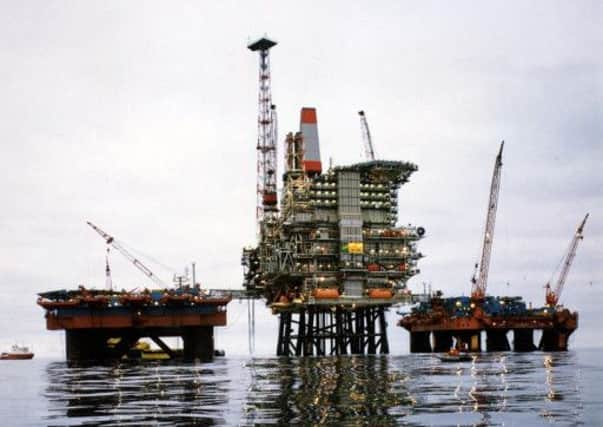Gordon Brown unveils plan ‘to keep oil flowing’


In a major speech tonight, the former prime minister will call for the creation of a North Sea reserve fund to help maintain and upgrade infrastructure and provide last-resort debt finance for companies who want to keep supplies flowing.
The Kirkcaldy and Cowdenbeath MP, who is stepping down from Westminster at May’s general election, believes the government could take over fields in partnership with some firms in order to save them from being “mothballed”.
Advertisement
Hide AdAdvertisement
Hide AdIn one of his last speeches before ending his 33-year political career as an MP, Mr Brown will say the industry is at a “tipping point” and call for the creation of 100,000 new hi-tech jobs north of the Border.
Ahead of his speech tonight, a week after Scottish Gas owners Centrica announced a 40 per cent cut in its North Sea investment, Mr Brown said: “For 30 years oil has averaged around 17 per cent of the Scottish economy. But our best estimate is that production will fall from a peak of 4.3 million barrels per day in 1999 to 1.3 million barrels per day in 2018.
FOLLOW US
SCOTSMAN TABLET AND MOBILE APPS
“The tax regime has always been controversial. I know this as a former chancellor and tax reductions are now necessary in the Budget. But a tax reduction for a loss-making operation is little help in the short term.
“This is not a normal downturn where we can automatically expect a full recovery when prices rise. One Budget initiative would be to recognise the tipping point we are at – the structural damage that could be done if fields are summarily abandoned – and create a North Sea reserve to maintain and upgrade essential infrastructure and to provide last-resort debt finance for companies who want to keep fields open.”
He added: “In the most extreme cases, to avoid the field being mothballed in its entirety, the government could go into partnership for a take-over of the field.
“If it is temporarily abandoned, the government should act to ensure that sometime in the future it is possible to come back and exploit the oil.”
The move, which is expected to become party policy, was branded “1970s-style nationalisation” by Scottish Tory energy spokesman Murdo Fraser.
He said: “As ever his timing is ludicrous, at a time when the North Sea has lost the most money since the 1970s. Going back to the days of nationalising like the 70s might be expected of the SNP, but it’s disappointing to hear it from Labour.”
Advertisement
Hide AdAdvertisement
Hide AdHowever, sources close to Mr Brown said this was “incorrect” because the government would go into partnership with the private sector rather than carry out compulsory takeovers or purchases.
The SNP accused Mr Brown of being responsible for the North Sea industry’s current woes.
Deputy leader Stewart Hosie said: “As a chancellor who treated Scotland’s oil as a cash cow, imposed the supplementary tax on the North Sea industry in the first place, then doubled it – and left office having failed to set up an oil fund to deliver any long-term benefit from our own natural resources – Gordon Brown is responsible for undermining investment in this vital industry.
“The Scottish Government has already published a comprehensive action plan to help the North Sea industry and protect tens of thousands of jobs, and it would be good if Mr Brown could help make up for the damage he did when in office by backing it.”
A Scottish Government spokeswoman said: “The Scottish Government recent policy paper sets out a range of taxation changes.
“Our proposed fiscal changes will not only boost the economy but analysis based on industry data shows that they will support thousands of jobs.
“We are calling for an investment allowance – as recommended previously by the Scottish Government in 2011 and Scotland’s Oil and Gas Expert Commission last year. This will simplify the fiscal regime and potentially boost investment by between £20 billion and £37bn – supporting up to 26,000 jobs annually.”